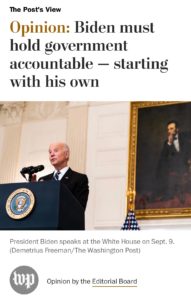DOWNLOAD ETHICS AS PDF
Fewer than 20 percent of Americans express trust in the government in Washington to do what is right.* The causes behind this deficit in trust are complex and multifaceted; however, there can be no question that bearing witness to pay-to-play influence and the revolving door between special interests and government has played a critical part. Although these forces have been present for decades, the recent rise in lobbyist-run agencies, the denigration of norms against conflicts of interest, and blatant examples of self-dealing across the federal government—including in the White House—have transformed a persistent ailment into a critical threat to the health of our democracy.
The administration must restore ethical principles to the executive branch in 2021 or risk making permanent Americans’ loss of trust in government. It is time to re-center ethics at the heart of American democracy by making strong commitments to follow ethical principles in all aspects of government decision-making and implementing reforms to make ethics rules stronger, more complete, and more effective. To do so, the administration should abide by the following four principles:
- The administration must elevate ethics as a core value by prioritizing meaningful structural ethics reforms and committing publicly to adhere to the rules and the values and norms behind them.
- The people in government should work for the public, not for personal or private interests.
- To judge whether the government is acting ethically and to hold unethical actors accountable, the government must preserve meaningful ethics records and make timely ethics disclosures.
- The public has a right to: meaningful disclosure concerning all individuals and organizations lobbying their elected officials; a government free from wealthy special interests placing their own loyal personnel into government posts; and a government free from former government officials exploiting their networks within government for personal gain.
The commitment to ethical government can, and must, start on January 20, either as a priority for a new administration or a course correction for a second term of the Trump administration. It begins with public statements of support for and voluntary conduct to adhere to once-recognized norms of ethical behavior within the White House. It includes issuing a strong executive order on ethics to bind the entire executive branch. And it concludes by prioritizing legislative reforms to make following ethics rules mandatory by transforming norms into laws.
Principle 3: The administration must elevate ethics as a core value by prioritizing meaningful structural ethics reforms and committing publicly to adhere to the rules and the values and norms behind them.
Principle 4: The people in government should work for the public, not for personal or private interests.
Principle 5: To judge whether the government is acting ethically and to hold unethical actors accountable, the government must preserve meaningful ethics records and make timely ethics disclosures.
Principle 6: The public has a right to: meaningful disclosure concerning all individuals and organizations lobbying their elected officials; a government free from wealthy special interests placing their own loyal personnel into government posts; and a government free from former government officials exploiting their networks within government for personal gain.
* Michael Dimock, How Americans View Trust, Facts, and Democracy Today, Pew Research Center, Feb. 19, 2020, available at https://www.pewtrusts.org/en/trust/archive/winter-2020/how-americans-view-trust-facts-and-democracy-today.

